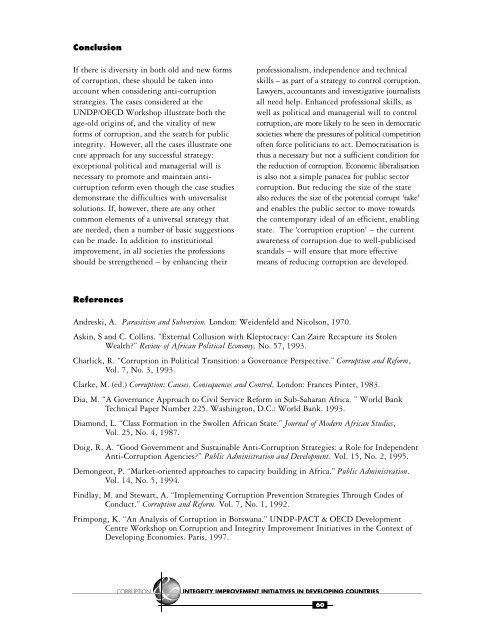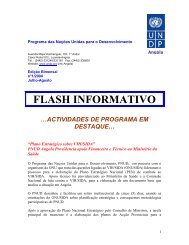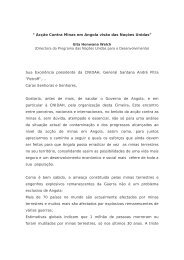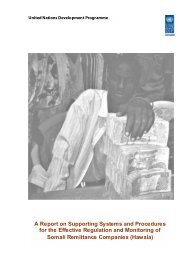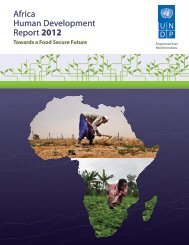CORRUPTION AND ANTI-CORRUPTION STRATEGIES ... - UNDP
CORRUPTION AND ANTI-CORRUPTION STRATEGIES ... - UNDP
CORRUPTION AND ANTI-CORRUPTION STRATEGIES ... - UNDP
You also want an ePaper? Increase the reach of your titles
YUMPU automatically turns print PDFs into web optimized ePapers that Google loves.
Conclusion<br />
If there is diversity in both old and new forms<br />
of corruption, these should be taken into<br />
account when considering anti-corruption<br />
strategies. The cases considered at the<br />
<strong>UNDP</strong>/OECD Workshop illustrate both the<br />
age-old origins of, and the vitality of new<br />
forms of corruption, and the search for public<br />
integrity. However, all the cases illustrate one<br />
core approach for any successful strategy:<br />
exceptional political and managerial will is<br />
necessary to promote and maintain anticorruption<br />
reform even though the case studies<br />
demonstrate the difficulties with universalist<br />
solutions. If, however, there are any other<br />
common elements of a universal strategy that<br />
are needed, then a number of basic suggestions<br />
can be made. In addition to institutional<br />
improvement, in all societies the professions<br />
should be strengthened – by enhancing their<br />
References<br />
professionalism, independence and technical<br />
skills – as part of a strategy to control corruption.<br />
Lawyers, accountants and investigative journalists<br />
all need help. Enhanced professional skills, as<br />
well as political and managerial will to control<br />
corruption, are more likely to be seen in democratic<br />
societies where the pressures of political competition<br />
often force politicians to act. Democratisation is<br />
thus a necessary but not a sufficient condition for<br />
the reduction of corruption. Economic liberalisation<br />
is also not a simple panacea for public sector<br />
corruption. But reducing the size of the state<br />
also reduces the size of the potential corrupt 'take'<br />
and enables the public sector to move towards<br />
the contemporary ideal of an efficient, enabling<br />
state. The 'corruption eruption' – the current<br />
awareness of corruption due to well-publicised<br />
scandals – will ensure that more effective<br />
means of reducing corruption are developed.<br />
Andreski, A. Parasitism and Subversion. London: Weidenfeld and Nicolson, 1970.<br />
Askin, S and C. Collins. “External Collusion with Kleptocracy: Can Zaire Recapture its Stolen<br />
Wealth?” Review of African Political Economy, No. 57, 1993.<br />
Charlick, R. “Corruption in Political Transition: a Governance Perspective.” Corruption and Reform,<br />
Vol. 7, No. 3, 1993.<br />
Clarke, M. (ed.) Corruption: Causes, Consequences and Control, London: Frances Pinter, 1983.<br />
Dia, M. “A Governance Approach to Civil Service Reform in Sub-Saharan Africa. ” World Bank<br />
Technical Paper Number 225. Washington, D.C.: World Bank. 1993.<br />
Diamond, L. “Class Formation in the Swollen African State.” Journal of Modern African Studies,<br />
Vol. 25, No. 4, 1987.<br />
Doig, R. A. “Good Government and Sustainable Anti-Corruption Strategies: a Role for Independent<br />
Anti-Corruption Agencies?” Public Administration and Development. Vol. 15, No. 2, 1995.<br />
Demongeot, P. “Market-oriented approaches to capacity building in Africa.” Public Administration.<br />
Vol. 14, No. 5, 1994.<br />
Findlay, M. and Stewart, A. “Implementing Corruption Prevention Strategies Through Codes of<br />
Conduct.” Corruption and Reform. Vol. 7, No. 1, 1992.<br />
Frimpong, K. “An Analysis of Corruption in Botswana.” <strong>UNDP</strong>-PACT & OECD Development<br />
Centre Workshop on Corruption and Integrity Improvement Initiatives in the Context of<br />
Developing Economies. Paris, 1997.<br />
<strong>CORRUPTION</strong>& INTEGRITY IMPROVEMENT INITIATIVES IN DEVELOPING COUNTRIES<br />
6 0


